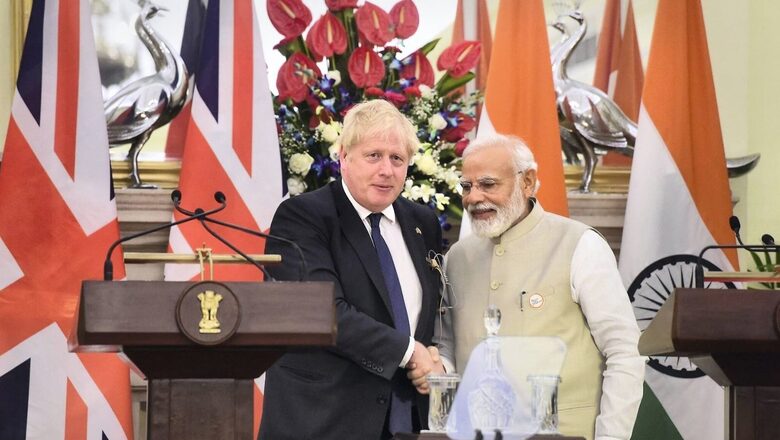
views
India and the United Kingdom on April 22 reaffirmed their commitment to collaboration for Vision 2030, which aims to create a more secure Indo-Pacific through open, accessible, and peaceful cyberspace.
After the meeting between Prime Minister Narendra Modi and UK Prime Minister Boris Johnson, a joint statement was released which said, “Through cyberspace, there is a digital living bridge that allows our citizens, students and businesses to interact and promote our shared prosperity.”
It added: “As we take advantage of the new opportunities this creates, we must also protect ourselves against evolving threats.”
It is noteworthy that both the countries signed an Enhanced Cyber Security Partnership in May 2021.
India and the UK reaffirmed their commitment on April 22 to a collaborative programme of cooperation centred on cyber governance, deterrence, resilience and capacity building to deliver this partnership. The rules-based international order, according to the joint statement, must be protected both online and offline.
The rising willingness of states and their proxies to engage in hostile cyber activities in violation of established standards of responsible state behaviour in cyberspace has concerned India and the UK. Considering such issues, the statement noted that both countries will improve their coordination on mitigation techniques for Advanced Persistent Threats, as well as their collaboration on cybercrime.
The UN Sixth Group of Governmental Experts on Advancing Responsible State Behaviour in Cyberspace in the Context of International Security and the ‘Open-Ended Working Group on Developments in the Field of Information and Telecommunications in the Context of International Security’ both reaffirmed the importance of voluntary and non-binding norms of responsible state behaviour in reducing risks to international peace, security, and stability in their 2021 reports.
The statement read: “We draw attention to the norms prohibiting the use of cyber tools to intentionally damage or impair critical infrastructure and the obligation of states to respond to appropriate requests to mitigate malicious ICT activity aimed at the critical infrastructure of another state emanating from their territory.”
Both countries pledged to work together to draught a comprehensive international convention under the UN framework to combat criminals’ use of ICTs to increase international cooperation on preventing, deterring, mitigating, investigating, and prosecuting cybercrime, as well as ensuring speedy justice for cybercrime victims while taking into account the need for appropriate safeguards, such as data protection.
However, under the ‘International Counter Ransomware Initiative’ India and the UK are working in cooperation.
Both the countries have announced that they will collaborate to strengthen their mutual cyber resilience, utilising a holistic and whole-of-society approach. They also noted that both countries will finish joint work to identify shared vulnerabilities and promote effective public-private partnerships, with the goal of ensuring that decisions on system design and deployment take public safety protections into account, as well as increasing public awareness and ability to increase resilience against the malicious cyber activity.
Additionally, these countries will continue to work closely with industry and international standards bodies to guarantee that Internet of Things (IoT)-connected devices are secure by design.
They said that both sides will support efforts to boost the availability and diversity of cyber skills in our workforce, as well as encourage interpersonal and educational connections to raise awareness in the cyberspace sphere.
India and the UK also recognised that governments cannot address the difficulties of the digital age alone and that the private sector plays a critical role in new technology development and implementation, as well as data management.
“We will work in collaboration with industry to deliver shared responsibilities to improve online safety and protect users online, working together with multi-stakeholders,” the statement said.
“We will continue to collaborate closely with digital service providers, social media and telecommunications companies, encouraging cooperation to embed safety in the services they offer while ensuring the protection of user privacy and their cooperation with the relevant government entities, especially with the onset of 5G and 6G technologies,” it added.
Read all the Latest India News here




















Comments
0 comment